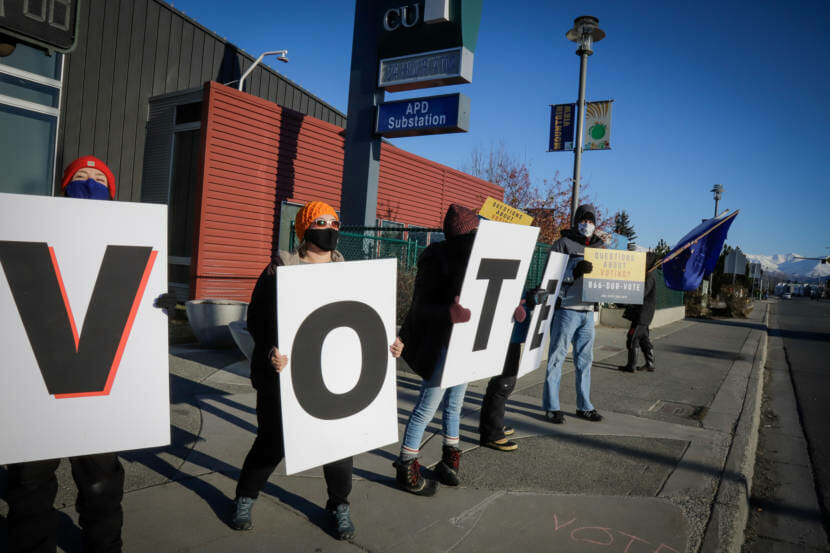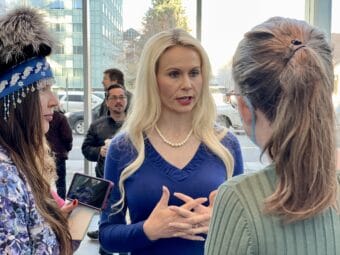
Compared to most other states, Alaska historically has had lower limits on how much an individual could give to a political candidate’s campaign. That changed last summer when a federal appeals court tossed out the state’s limit of $500 per person per year, saying it limited free speech.
A recommendation from staff at the state’s campaign finance watchdog agency, the Alaska Public Offices Commission, has raised the limit to $1,500.
But according to a recent story in the Anchorage Daily News, it remains uncertain if APOC’s commissioners will raise or lower the limit, whether the Legislature will step in or who even has the legal authority to make those kinds of changes.
As ADN reporter Nat Herz explains, despite the uncertainty, concern remains about the influence of money in politics.
Listen here:
The following transcript has been lightly edited for clarity.
Nat Herz: One set of Alaska’s limits came right after the VECO scandal where we saw lawmakers accepting bribes in exchange for official favors, basically, while they were working in the Legislature. And, you know, it’s sort of a commonly understood problem and concern that if you allow individual donors to give inordinate amounts of money to candidates’ campaigns, that those candidates will then be indebted to their donors when they get elected and do special things for them that are not in the greater public interest. So that kind of takes us up to about six years ago, which is when a lawsuit was filed, that brought us to this very significant decision that was handed down by a federal appeals court over the summer.
Casey Grove: So, on the other hand, you have people making arguments, including in this lawsuit that ended up before the Ninth Circuit Court of Appeals, that that money is essentially people’s right to free speech, or that it’s a freedom of speech issue, right? Can you explain that?
Nat Herz: Yeah, I mean, I think it depends who you are and what your political philosophy is. Certainly, your right to express yourself is, I think, undisputed that that’s a right that you have under the First Amendment in the Constitution. The flip side of that is, there’s this equation that is done of donating money to a political candidate, or donating money to another campaign that is pushing some candidate or cause that is, effectively, the equivalent of free speech, and that’s basically what the federal courts have decided. There were a series of decisions back about 10 years ago by the Supreme Court that really kind of loosened restrictions. The most important thing was this decision, Citizens United, that allowed donors, including unions and corporations, to give unlimited sums to these entities called Super PACs or independent spending groups — they don’t coordinate with candidates. And according to the Supreme Court’s position and its landmark Citizens United decision from 2010, the fact that you can’t have these groups officially communicating with candidates and strategizing with them, is a way to avoid the appearance or the actual occurrence of what’s called “quid pro quo corruption,” which is sort of the exchange of campaign contributions for official action.
Casey Grove: But in the story that you wrote, with Iris Samuels at ADN, there’s another opinion that loosening those laws or raising the limit or getting rid of a limit altogether for individual contributions, brings that relationship back to being between the actual constituent making a donation and the candidate, right?
Nat Herz: I think it’s a very legitimate point by Robin Brena that, look, basically, under Citizens United, the U.S. Supreme Court has permanently enshrined individuals’ rights and corporations’ rights and unions’ rights to give as much money to these super PACs and independent spending groups as they want to, while still maintaining fairly restrictive limits on donations to individual candidates and individual sort of party type PACs. And that money is flowing into these campaigns that then becomes sort of unaccountable to the candidate themselves and can really be these kind of pirate ships floating out there in the political arena where they’re not really accountable to anyone. Robin’s point is that if we’re going to have this much money flowing into the political system, then it’s much better to have this money flowing into the candidates’ campaigns so that at least when we see these campaigns playing out and we see questionable or egregious or whatever other things being stated or argued or advertised by the campaigns, at least there’s someone — namely the candidate — who’s actually accountable for the things being said.
Casey Grove: And we’re in this position now where the Alaska Public Offices Commission has made a recommendation of what they think the limit should be, but it’s up to the Legislature to actually set the limit.
Nat Herz: Yeah, well, there’s just a big question around who has what authority to do what here. I mean, certainly the staff at the campaign finance agency, the Alaska Public Offices Commission, thought that they had authority to set sort of interim limits until and unless the Legislature acts. Robin Brena, who was the attorney for the plaintiffs in this lawsuit that got the limits overturned, he doesn’t believe the commission has that authority. And actually, the commission’s commissioners, who have the final say on this preliminary decision by staff, have not actually approved the new limits that the commission staff has proposed — a $1,500 limit for donations to candidates and $3,000 for donations to political action committees. The Legislature also has some proposals kind of in the hopper, but a lot of questions and skepticism about whether they’ll get very far because you have the two committees that have jurisdiction over this issue — one in the House, one the Senate. The leaders and the chairmen of those committees really have pretty different opinions about which way the state should go on this — one’s a Democrat, one’s a Republican. And then I think there’s also going to be continued questioning around whatever limit anyone sets, even if they’re higher than the old ones were. And I think depending on where the limits get set, you may see continued legal challenge.



